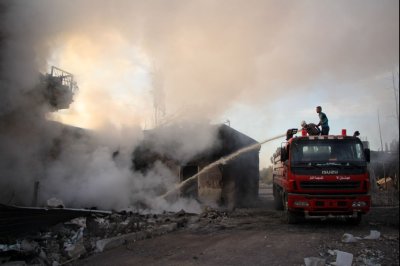Topic: Bashar al-Assad
Quotes
Nobody can overlook Iran, whether you like it or not
Assad: Arab world must reform Jan 31, 2011
Is it going to be a new era toward more chaos or more institutionalization? That is the question
Assad: Arab world must reform Jan 31, 2011
Anyone who thinks that Syria may negotiate on its occupied land, is mistaken because liberating the Golan is a right that resides in the hearts of the Syrians as people, army and leadership
Assad warns chances of war increasing Aug 01, 2010
There is a different leader in Syria now. Many of the members of Congress of both parties who have gone to Syria in recent months have said they believe he's a reformer
Clinton contrasts Syrian, Libyan unrest Mar 27, 2011
Syrian authorities that they are accountable under international human rights law for all acts of violence perpetrated by them against the civilian population
Hama attacked again; U.N. meeting urged Aug 01, 2011
Bashar al-Assad (Arabic: بشار حافظ الأسد, Baššār al-ʾAsad; born 11 September 1965) is the President of Syria and Regional Secretary of the Ba'ath Party. His father Hafez al-Assad ruled Syria for 29 years until his death. Al-Assad was elected in 2000 and 2007, but was unopposed each time.
Bashar al-Assad was born in Damascus on 11 September 1965, the son of Aniseh (née Makhluf) and Hafez al-Assad. Initially Bashar had few political aspirations. His father had been grooming Bashar's older brother, Basil al-Assad, as a future president. Bashar studied ophthalmology at Damascus University 1988 and arrived in London in 1992 to continue his studies. He was recalled in 1994 to join the Syrian army after Basil's death in an automobile accident. Bashar entered the military academy at Homs, north of Damascus, following the death of Basil, and was propelled through the ranks to become a colonel in January 1999. The accident made Bashar his father's new heir-apparent.
When the elder Assad died in 2000, Bashar was appointed leader of the Baath-Party and the Army and was elected president unopposed with what the regime claimed to be a massive popular support (97.2% of the votes), after the Majlis Al Sha'ab (Parliament) swiftly voted to lower the minimum age for candidates from 40 to 34 (Assad's age when he was elected). On 27 May 2007 Bashar was approved as president for another seven-year term, with the official result of 97.6% of the votes in a referendum without another candidate.
It uses material from the Wikipedia article "Bashar al-Assad."














